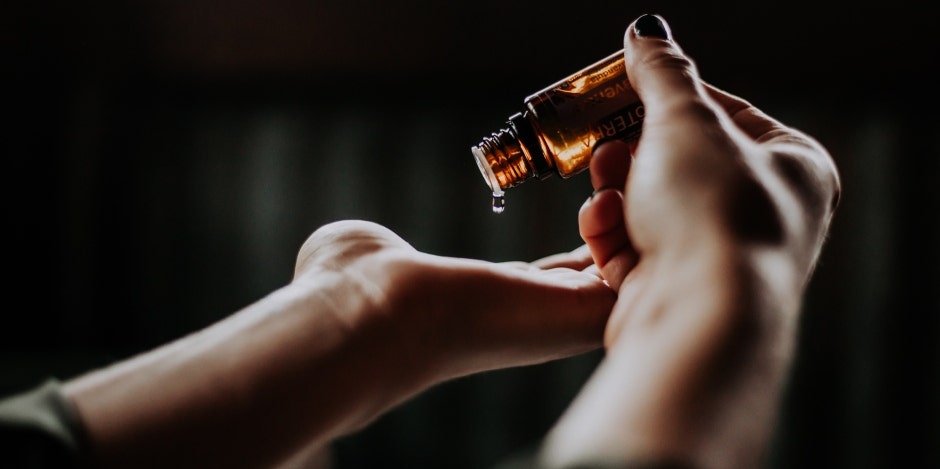The Different Types Of Essential Oils And How Aromatherapy Works
Just breathe—it's as simple as that.
 unsplash / christin hume
unsplash / christin hume By Brianne Hogan
When we’re feeling stressed or overwhelmed, we might turn to a lavender oil-infused bubble bath. In need of a pick-me-up? We’ll turn on our diffuser using peppermint oil.
And why shouldn’t we? After all, aromatherapy is not just a trendy wellness buzzword; it’s been used to promote physical, mental and spiritual health for thousands of years.
“Aromatherapy is a complementary and integrative health and wellness modality that supports our own innate ability to heal and stay healthy,” Amy Galper, co-founder of the New York Institute of Aromatic Studies, explains.
The practice, says Galper, focuses on using essential oils, which are the aromatic components extracted via steam distillation from various plant materials “to affect change and reestablish balance in body, mind and spirit.”
How does aromatherapy work?
According to Galper, the molecules in essential oils travel into the body via inhalation as well as through the skin when applied topically, such as when they’re incorporated into skin care products.
“When we breathe in the vapors of essential oils, these aromatic molecules travel into the body via two very different pathways,” she explains. “First, they enter our lungs and get absorbed into our blood when we breathe in oxygen, and second, they trigger electrical impulses that travel along our olfactory nerve bulb and connect into our limbic system, which controls our every action—from our emotional responses to regulating our heartbeat, digestion, temperature and nervous system.”
While indulging in a lavender-scented bath is heavenly, does aromatherapy actually have any real health benefits? We asked the experts exactly that in addition to asking for tips on which oils help with what.
Peppermint oil
Suffering from a headache? Then you might want to topically apply peppermint oil to help soothe you. “Though the studies are small there are randomized controlled trials showing efficacy of peppermint oil topically in tension headaches,” Dr. Joe Feuerstein, a physician and associate professor of clinical medicine at Columbia University and director of integrative medicine at Stamford hospital, explains. “The peppermint has compounds that work on the calcium channels of muscle to relax them.”
Additionally, a 2014 study out of Keimyung University and Daeduk College in Korea found that peppermint oil also promoted hair growth without toxic signs through topical application.
Lemon balm
Feuerstein says lemon balm has been proven to help reduce agitation in people with Alzheimer’s diseases due to its compounds “that relax the nervous system.”
Other research has found that lemon balm, when in combination with other herbs, may help indigestion as well as insomnia and anxiety.
Lavender
Perhaps the big kahuna of aromatherapy is lavender, which has been found to improve an array of ailments, including pain intolerance, depression as well as helps to prevent stress, anxiety, and postpartum depression in women. A 2005 Wesleyan University study found that lavender also serves as a mild sedative and helps to promote deep sleep.
Ginger
In addition to the essential oils mentioned above, ginger oil has been found to improve nausea, and orange oil was found to relieve pain in patients with fractured limbs.
Is it just hype?
Despite these studies that promote the efficacy of aromatherapy, there are differing studies, including one in 2000 and another in 2012, both from Dr. Edzard Ernst, former chair of complementary medicine at the University of Exeter, which found no convincing evidence aromatherapy is beneficial to one’s health.
While some findings of aromatherapy’s benefits might be contradictory, there’s no denying that scent plays a profound and dramatic role in our health, says Galper.
“It has a direct impact in how we respond to stress,” she says. “Stress triggers how our body manufactures and produces key proteins and enzymes, which in turn become our hormones, which regulate every action in our bodies. By smelling an aroma we recognize as pleasant, our body responds by sending neurological signals to our limbic system to produce hormones that calm us and regulate and balance the functions in our body, from reproduction to digestion to breathing, our muscles, etc.”
So, if a certain scent makes you want to scrub your troubles away, there’s no harm in taking that bubble bath.
Brianne Hogan is a writer for StyleCaster.

